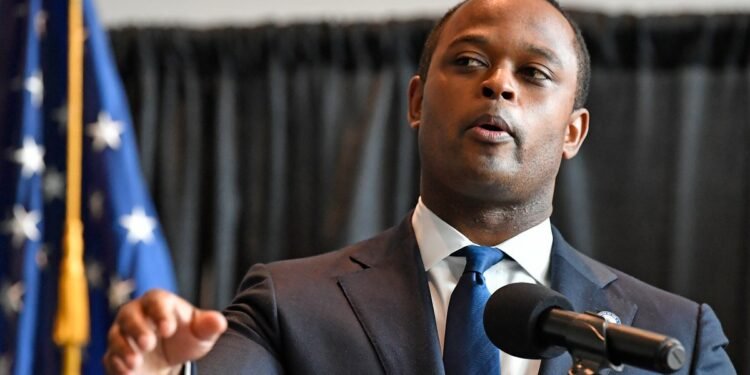[ad_1]
Kentucky Attorney General Daniel Cameron addresses the media following the return of a grand jury investigation into the death of Breonna Taylor. (AP Photo/Timothy D. Easley)
When Kentucky Attorney General Daniel Cameron announced this week that no charges would be brought in direct connection with Breonna Taylor’s death, he underscored that the officers executing the search warrant that night did identify themselves at Taylor’s door, pointing to a witness who corroborated the officers’ version of events.
But, according to audio and documents obtained by VICE News, that same witness changed his story in the months following the deadly raid.
The witness is Aarin Sarpee, who was picking up his daughter from his brother’s apartment above Taylor’s at the time of the raid. According to officers’ interviews with investigators, Sarpee got into an argument with Detective Brett Hankison as the officers were banging on Taylor’s door.
The interviews were conducted by LMPD’s Public Integrity Unit (PIU), which investigates officer-involved shootings. According to the Public Integrity Unit’s investigative file, LMPD investigators spoke to Sarpee on the phone twice in the ensuing months. On March 21, a week after the shooting, Sgt. Jason Vance asked Sarpee directly if he heard anyone identify themselves as police. Sarpee responded, “No, nobody identified themselves.”
Another PIU investigator, Sgt. Amanda Seeyle, called Sarpee back two months later, on May 15, the file shows. At that point, Sarpee said he did hear police say, “This is the cops.”
This isn’t the only instance of the attorney general presenting a single narrative from conflicting evidence. As VICE News reported this week, the initial Kentucky State Police ballistics report could not conclude that the bullet that struck Sgt. Jon Mattingly in the leg came from the gun of Taylor’s boyfriend, Kenneth Walker. The FBI later produced its own ballistics report, the findings of which have not been released. Yet at the press conference announcing charges, Attorney General Cameron stated as fact that Walker’s bullet hit Mattingly.
The summary of LMPD’s interactions with Sarpee also raises questions about the way in which those conversations were documented and presented as part of the department’s investigative file. At the end of the taped conversation on March 21, Sgt. Vance tells Sarpee they will call him the following day to conduct a formal interview, but no interaction is documented until April 1, when Sgt. Seelye writes in the file that she calls and texts him, but does not receive a response. Seelye later leaves a voicemail for Sarpee on May 14.
On May 15, Seeyle and Sarpee speak on the phone. During this conversation, Seeyle makes a reference to a previous conversation she says she had with Sarpee. But according to the investigative file reviewed by VICE News, there is no record of them speaking at any point prior to that phone conversation. Seelye proceeds to press Sarpee on two specific points: whether he knew they were police, and whether he heard the officers announce themselves.
During the May conversation, which spans almost 7 minutes, Sarpee shifts his account and says he heard police say “this is the cops,” corroborating the testimonies of the seven officers on scene.
“It’s been so long now,” Sarpee tells Seeyle on the call. “I recall some of it.”
Walker’s attorney, Steve Romines, who says he has reviewed the file and listened to Sarpee’s interviews, told VICE News he believes the shift makes Sarpee’s account unreliable.
“You cannot in good faith look at Sarpee’s interviews and try to rely on him to establish that police announced themselves,” Romines said. “He’s obviously confused over the course of his interviews.”
“It’s pretty clear to me that they’re [the police] trying to create the narrative that benefits them,” he added.
The drastic change in Sarpee’s account is notable given the attorney general’s sole reliance on Sarpee’s testimony to corroborate the involved officers’ claims that they announced themselves prior to ramming through Taylor’s front door. More than a dozen other neighbors, including two who live in the same unit, told VICE News that they never heard police say who they were.
LMPD and the Attorney General’s office did not immediately respond to requests for comment.
When reached by VICE News, Sarpee declined to comment, saying he needed to speak to his lawyer first. Sarpee’s lawyer could not be reached for comment.
But, according to audio and documents obtained by VICE News, that same witness changed his story in the months following the deadly raid.
The witness is Aarin Sarpee, who was picking up his daughter from his brother’s apartment above Taylor’s at the time of the raid. According to officers’ interviews with investigators, Sarpee got into an argument with Detective Brett Hankison as the officers were banging on Taylor’s door.
The interviews were conducted by LMPD’s Public Integrity Unit (PIU), which investigates officer-involved shootings. According to the Public Integrity Unit’s investigative file, LMPD investigators spoke to Sarpee on the phone twice in the ensuing months. On March 21, a week after the shooting, Sgt. Jason Vance asked Sarpee directly if he heard anyone identify themselves as police. Sarpee responded, “No, nobody identified themselves.”
Another PIU investigator, Sgt. Amanda Seeyle, called Sarpee back two months later, on May 15, the file shows. At that point, Sarpee said he did hear police say, “This is the cops.”
This isn’t the only instance of the attorney general presenting a single narrative from conflicting evidence. As VICE News reported this week, the initial Kentucky State Police ballistics report could not conclude that the bullet that struck Sgt. Jon Mattingly in the leg came from the gun of Taylor’s boyfriend, Kenneth Walker. The FBI later produced its own ballistics report, the findings of which have not been released. Yet at the press conference announcing charges, Attorney General Cameron stated as fact that Walker’s bullet hit Mattingly.
The summary of LMPD’s interactions with Sarpee also raises questions about the way in which those conversations were documented and presented as part of the department’s investigative file. At the end of the taped conversation on March 21, Sgt. Vance tells Sarpee they will call him the following day to conduct a formal interview, but no interaction is documented until April 1, when Sgt. Seelye writes in the file that she calls and texts him, but does not receive a response. Seelye later leaves a voicemail for Sarpee on May 14.
On May 15, Seeyle and Sarpee speak on the phone. During this conversation, Seeyle makes a reference to a previous conversation she says she had with Sarpee. But according to the investigative file reviewed by VICE News, there is no record of them speaking at any point prior to that phone conversation. Seelye proceeds to press Sarpee on two specific points: whether he knew they were police, and whether he heard the officers announce themselves.
During the May conversation, which spans almost 7 minutes, Sarpee shifts his account and says he heard police say “this is the cops,” corroborating the testimonies of the seven officers on scene.
“It’s been so long now,” Sarpee tells Seeyle on the call. “I recall some of it.”
Walker’s attorney, Steve Romines, who says he has reviewed the file and listened to Sarpee’s interviews, told VICE News he believes the shift makes Sarpee’s account unreliable.
“You cannot in good faith look at Sarpee’s interviews and try to rely on him to establish that police announced themselves,” Romines said. “He’s obviously confused over the course of his interviews.”
“It’s pretty clear to me that they’re [the police] trying to create the narrative that benefits them,” he added.
The drastic change in Sarpee’s account is notable given the attorney general’s sole reliance on Sarpee’s testimony to corroborate the involved officers’ claims that they announced themselves prior to ramming through Taylor’s front door. More than a dozen other neighbors, including two who live in the same unit, told VICE News that they never heard police say who they were.
LMPD and the Attorney General’s office did not immediately respond to requests for comment.
When reached by VICE News, Sarpee declined to comment, saying he needed to speak to his lawyer first. Sarpee’s lawyer could not be reached for comment.
[ad_2]
Source link









